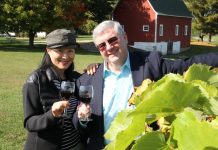
David Bos and the wine industry go back a long way. The longtime specialist vineyard consultant and Michigan native is finally realizing a dream of opening a winery — with his wife, Jackie — in his home state. They bought a 10-acre farm between Traverse City and Elk Rapids where they live with their 7- and 9-year-old children and plan to grow grapes organically. Meanwhile, they’re buying Michigan grapes from vineyards Bos consults with, and making their wine at a custom crush facility in the area. Their tasting room, Bos Farmhouse, debuts soon in downtown Elk Rapids and will be featuring both their wines made in California as well as the ones they produce in Michigan. Here, Bos discusses how they got here and where they’re going.
Q. How did you and your wife meet?
A. I worked up in Traverse City in 2003 and 2004 at Chateau Grand Traverse. Back then, there were only a dozen wineries or so (in northern Michigan), and I knew I had to go West — to Napa, where I went to work at Grgich Hills Estate. Jackie is from California and a landscape architect by trade. We just met through mutual friends in Napa. We dreamed up this idea of doing Bos Wine when we got married in 2008. We had our first vintage in 2010, two barrels of Phoenix Ranch Syrah.
Q. Tell us about your history as a consultant.
A. I helped Grgich convert all their acreage to biodynamic farming (similar to organic farming). It became a poster child for biodynamic farming, and helped a lot of other vineyards get up and running with these practices. Then Phoenix Ranch hired me to do some consulting, and I ended up with a slew of other clients. Now that we’ve moved to Michigan, I still do a little consulting out there.
Q. Have you been consulting to Michigan wineries as well?
A. Mari Vineyards is the biggest one, and I work with small growers. When people call me, I have two focuses: making world-class wine and changing farming. So my approach (before taking on a consulting job) is, which of the two are you fitting in?
Q. What prompted your return to Michigan?
A. We were looking all up and down the West Coast on where to grow the business because we had a label but no vineyard or tasting room. We wanted to find a spot where both the business and family could thrive — California, Oregon. One day we had friends over and after they left, Jackie said, “Why not Traverse City?” We’d been there quite often — we’d come back to Michigan every July to see family for a couple of weeks. I said I could move tomorrow.
Q. Tell us about the California and Michigan wines you are making.
A. We mainly are focused on white blends — Pinot Gris, Riesling and, playing around, skin-fermented Pinot Gris. Typically, my thing is to make a couple of barrels and see what I think of it and then put it into larger production. We’ll probably be doing 400 to 600 cases of California wines. Right now I’ve got a California license and we should get (Michigan) approval in three weeks, then final approval, inspections, then label approval. We’re still very small. Compared to other wineries, if they’re like a restaurant, then we’re like a food truck. It will be great when I can say, “We’re like a diner now.”
Q. Starting in 2022, you’re planning to grow Michigan grapes at your farm. Do you see more vineyard expansion in northern Michigan outside of the better-known traditional areas like Old Mission and Leelanau?
A. In the area between Traverse City and Elk Rapids where our farm is, the height/elevation and soil types aren’t that different (from the peninsulas). I notice in the summer it’s a little warmer than Old Mission and winter is a little colder. But it’s OK if you’re a (grape-growing) pioneer in that area. In general, I think our grapes are going to ripen up a little earlier, and I think we might bud out a little later. Ten to 20 years from now, if the wine industry takes off like I believe it’s going to, we’ll be sitting in a really good location. I think there’s a lot of areas up here that are undiscovered and have the potential for being amazing planting areas. I don’t think we will discover them all in my lifetime and I’m in my 40s.
Q. How does it feel to have become a part of the wine scene in Michigan?
A. It’s great. We’re hitting it at the right time. I want to see this region grow, and grow into a region where we’re making world-class wine as a group, and get our farming practices up to a standard where we can say we can play ball with Europe and the West Coast.












Facebook Comments